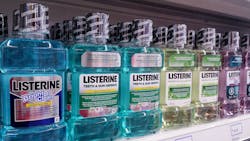In brief: Damage-free whitening; COVID-19 and mouthwash
Damage-free whitening coming soon?
Patients love anything whitening, but dental pros know that whitening pastes only remove surface stains and can harm enamel. A new study looked at a new hydrogel treatment that breaks apart biofilms and whitens teeth without damaging them. Following treatment with the hydrogel and green light, heavily stained test teeth got brighter over time, and there was no damage to the enamel. In another set of experiments, the team showed that the treatment killed 94% of bacteria in biofilms.
COVID-19 and mouthwash: Current recommendations
Since the start of the pandemic, researchers have been speculating about whether SARS-CoV-2 can be killed or slowed down by OTC mouthwashes. Mouthwashes have been shown in some studies to help break down the protective barrier—the viral envelope—around viruses like SARS-CoV-2, but at this stage of the pandemic, both researchers and mouthwash manufacturers are stopping short of recommending mouthwash as an effective tool for combatting COVID-19.
Disability training pledged by AMA, ADA
Disability Scoop reports that the American Medical Association (AMA) and the American Dental Association (ADA) have pledged to better prepare students to treat people with intellectual and developmental disabilities. The groups say they expect to establish a timetable for training and that they believe such training needs to be mandatory for future doctors and dentists to treat and care for patients with disabilities.
Dental care reduces risk for nonventilator hospital-acquired pneumonia
Researchers report that patients who have preventive dental treatment within 12 months or periodontal treatment within 6 months being hospitalized have a reduced risk for nonventilator hospital-acquired pneumonia: “Because most pneumonia starts from germs in the oropharyngeal cavity, it seemed logical that access to dental services could also impact the cases of nonventilator hospital-acquired pneumonia (NVHAP) — the number one hospital-acquired infection.”
